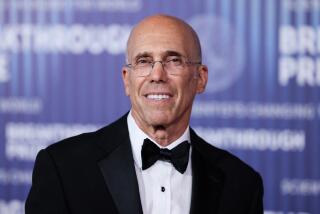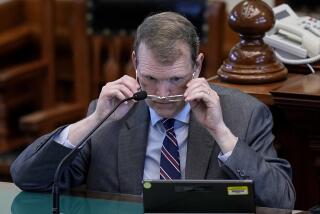Clinton Ties May Imperil Panetta’s Bid
- Share via
As debuts go, it was not all that Leon Panetta might have hoped. Just before he delivered a high-profile speech in Sacramento earlier this month--a political homecoming and his first public flirtation with the 1998 governor’s race--he was peppered with questions by reporters.
Not about his issue positions. Not about possible campaign themes. Instead, the former White House chief of staff was pressed about his connection to the campaign corruption allegations consuming Washington and his former colleagues.
“Panetta: Scandals wouldn’t ruin his bid,” the next-day headline in the San Jose Mercury News, his hometown paper, tartly summed up.
Much against Panetta’s wishes, the tentacles of controversy from his last job are wrapping around the courtship of his next.
The campaign fund-raising scandal in Washington may not be inflicting much damage so far on Panetta’s former boss, President Clinton, whose popularity ratings remain relatively high. But political strategists of various stripe believe that Panetta’s potential candidacy is threatened--even before it begins--by the furor over White House coffees, Lincoln Bedroom sleepovers and illegal foreign campaign contributions.
Panetta’s strength, his utter command of the White House operation under Clinton, has now become his greatest liability, placing him squarely in the center of a scandal that unfolded on his watch.
The former Monterey congressman, who resigned as chief of staff and returned to California after Clinton’s second inauguration, has not been accused of any illegalities. Moreover, he says--and administration insiders confirm--that in the White House he played a mostly managerial role, leaving major political decisions to others, particularly Deputy Chief of Staff Harold Ickes.
But Panetta attended the key meetings where political decisions were made, chipped in advice at times, and made it his job to see that decisions, once made, were implemented.
“He was clearly in charge,” said one Democrat with close ties to the White House. And in the heat of a gubernatorial campaign, most other details will be in danger of being lost to public perception.
“Leon Panetta is a campaign commercial waiting to happen,” said Dan Schnur, a Republican consultant and former aide to Gov. Pete Wilson.
Many Democrats agree. “I think it croaks him,” said one party strategist. “In reality, he’s going to be lucky this summer if he’s not in Washington testifying before congressional committees.”
Panetta appears particularly vulnerable to the travails of the Clinton administration because his position in the gubernatorial race is so precarious.
While he is known and well-liked in Washington, where he has worked most of his adult life, Panetta is a mystery to many Californians. An October Los Angeles Times poll found that 54% of registered voters had not heard enough about him to have an impression. Of those who had, 23% had a favorable impression of Panetta and 18% were unfavorably disposed.
In June 1994, Panetta was plucked from the Office of Management and Budget, which he headed, to serve as Clinton’s staff chief and ride herd on a White House in chaos. He became the iron keeper of the president’s schedule, funneling access to Clinton and signing off on how the chief executive spent his time.
In an interview Friday, Panetta insisted he never kept close tabs on campaign or fund-raising activities, leaving oversight of those functions to Ickes.
“I was not reviewing the checks as they came in,” Panetta said, though he acknowledged being kept aware of progress toward overall fund-raising goals. “I viewed my role as chief of staff as making sure the business of the country was dealt with.”
White House insiders confirm that Panetta never reviewed guest lists for the more than 100 controversial fund-raising coffees held at the White House and attended by such questionable figures as a Chinese arms merchant and a convicted stock swindler. Panetta attended just two of the coffee klatches.
But Panetta’s proximity to power--and specifically his role as gatekeeper to the Oval Office--may make it difficult for him to shrug off the charges, Democrats and Republicans agree.
Testament to that is a document that political strategists consider likely to be prominent in any anti-Panetta campaign. In January 1996, the chief of staff received a memo from deputy Evelyn Lieberman that suggested, for a few weeks at least, raising money would be given a higher priority in the Oval Office than setting policy.
In order to give Clinton time to attend fund-raising coffees, Lieberman said, “staff who routinely brief the President will be asked to be flexible during this period and accept that their briefings may be considerably truncated or eliminated.”
But Panetta said the only briefings he remembers cutting back were Clinton’s regular sessions with his Council of Economic Advisers, who continued to provide the president with written reports. “I never really set aside any briefings that we thought were important to the president,” Panetta said. “My view was that the president’s first responsibility was to govern the nation.
“In a campaign year, we had to dedicate more time to campaign trips as well as meetings that were associated with the campaign,” he said. But “with regard to foreign policy briefings, with regard to issues we were dealing with on the Hill, on budget issues, etc., I always maintained those briefings for the president.”
He said he recalled no details of the two fund-raising coffees he attended. The first occurred Feb. 8, 1995, and among the attendees were several Democratic fund-raisers, according to White House records.
The second session took place May 3, 1995. Among the attendees were party fund-raisers, a Jewish community activist, a former congressman and a college classmate of Hillary Rodham Clinton’s.
The swirl of allegations surrounding the White House and its money-raising practices is potentially damaging to Panetta for another reason: He has no significant fund-raising base of his own, either national or statewide, and presumably hoped to piggyback on Clinton’s own extensive network.
While gubernatorial hopefuls such as Lt. Gov. Gray Davis, a Democrat, and Atty. Gen. Dan Lungren, a Republican, amassed millions last year, Panetta will have to raise money this year under restrictive new rules. They limit donations in statewide races to $500 per donor for the primary and $500 for the general election, figures that double if a candidate accepts voluntary spending limits.
In Panetta’s most expensive race, his last congressional bid in 1992, he spent $518,958. Candidates for governor are allowed to spend $14 million under the new state law.
Panetta, who has said he will decide whether to run by early summer, is not the only potential gubernatorial candidate touched by the spreading scandal.
U.S. Sen. Dianne Feinstein was among a handful of politicians warned by the FBI about a purported Chinese government effort to buy influence via campaign contributions. She returned $12,000 in campaign donations as a result of the current controversy.
Davis also received contributions from John Huang, the former Democratic Party fund-raiser at the center of the current scandal. Garry South, Davis’ campaign manager, said Huang and his wife donated $10,000 to Davis between 1987 and 1993. None of the money has been returned, he said.
Political strategists say anyone who targets the former chief of staff will have to take great care. As Panetta himself put it: “There isn’t anybody running who hasn’t engaged in fund-raising.”
“I have 30 years of public service that I suspect people will judge me on,” Panetta continued. “Beyond that, I’m proud of the service I provided as chief of staff. I organized the White House staff, helped the president put his team together . . . helped defeat the direction the Republicans wanted to take the nation and helped reelect a president. I’m proud of that service.”
Times researcher Lianne Hart in Washington contributed to this story.
More to Read
Get the L.A. Times Politics newsletter
Deeply reported insights into legislation, politics and policy from Sacramento, Washington and beyond. In your inbox twice per week.
You may occasionally receive promotional content from the Los Angeles Times.












